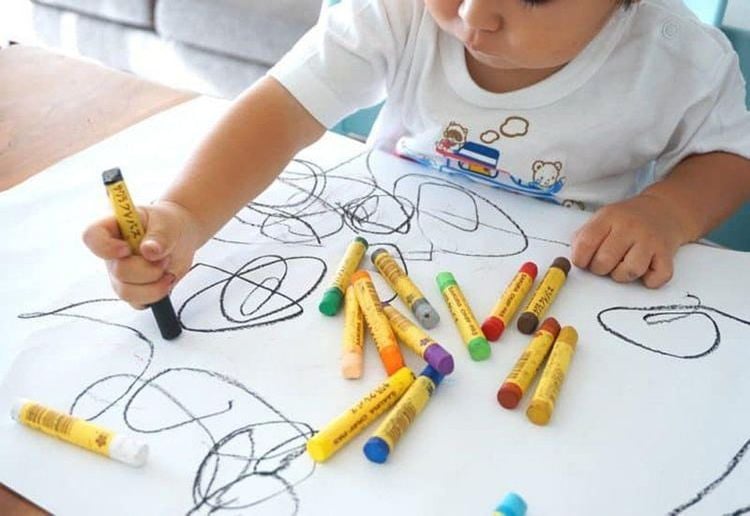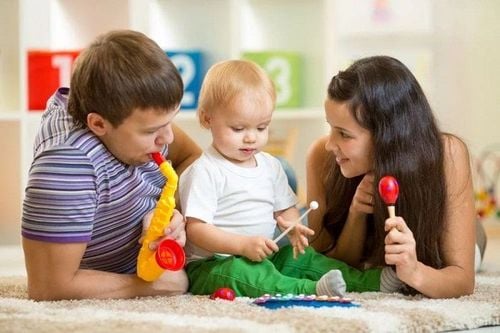This is an automatically translated article.
The article was professionally consulted with Doctor Ho Thi Hong Tho - Neonatologist - Pediatrics - Neonatology Department - Vinmec Phu Quoc International General Hospital.Kindergarten children at 31 months have quite a lot of changes in body shape, growing quickly and strongly in height. Your child's motor skills are also improving, he knows how to jump, lift his feet off the ground. Children can talk more with a rich vocabulary, as well as like to ask questions.
1. Understand the rules and standards of adults
A 31-month-old preschooler begins to have a basic awareness of adult standards and behaviors. So don't be surprised when your child discovers mistakes - like seeing another kid get candy before dinner or when he or she doesn't get a bath one night. If you find your child confused by these unusual things, explain that routines and rules can sometimes be flexible depending on the situation, but that you will have the final say, when to follow and when to skip.Parents should start teaching their 32-month-old preschooler familiar with basic rules of conduct such as:
Saying “Thank you” and “Sorry”: Parents must often use these two words with their baby and with each other, as well as when talking to people. Thank your child when he helps you with something, apologize when he misunderstood. You also have to proactively suggest when your child forgets to thank/sorry in the right situation. Such repetition will create a habit, helping your child to become a polite and conscious person. Well-behaved: Seeing parents well-behaved and caring towards others has a big effect on children, as children most likely learn from imitating those close to them. Your baby will notice and learn when you often hear you say “How are you?” or “Excuse me, let me come over” in the supermarket. Show your child the results of your actions: Find ways to show your child how giving someone a gift or helping someone makes them happy. On the contrary, fighting or slandering another person upsets them. For children as young as two and a half years old, following the rules requires gentle and patient guidance from adults. You should ignore the baby and be flexible about the rules when your child is sick or tired. Don't be a perfectionist and ask your child to always do everything perfectly, because even adults sometimes make mistakes.

Trẻ mới 2 tuổi rưỡi, để tuân thủ các quy tắc cần sự hướng dẫn nhẹ nhàng và kiên nhẫn từ người lớn
2. Change the way you talk depending on the listener
As a 32-month-old preschooler's perception of others continues to develop, he or she will begin to change the way he speaks depending on who is listening. Your baby will begin to use different words and voices with peers or adults. You may even notice your child uses simpler language when talking to a younger child.At this age, dolls are not just for hugging, but girls have seen them as a person with a name, a family, needing to eat, bathe and talk softly. For a boy, just put a towel behind his back, he has turned into a superhero with a strong voice, confidently destroying evil.
3. Telling stories that are not true
In addition to being able to sing some short children's songs or tell expressive stories, sometimes children this age won't tell the truth. For preschool children 31 months - 32 months, the line between reality and virtual is still blurred. Your child may deny that he or she is the perpetrator of the graffiti on the wall. It's not that I intentionally lied to you, but because I wish I hadn't.In this situation, encourage your child to tell you what really happened, as well as try to control his anger or frustration. At the same time, parents must explain that lying is unacceptable, worse than the wrong behavior that the child has unintentionally done. By showing your child that telling the truth isn't scary, you'll improve the situation and teach your child honesty from a young age.
Also, if your child has another bad habit that you don't like, try to ignore his actions. Most likely, your baby is intentionally doing things that are forbidden by your parents to get attention, or even to irritate you. Be prepared to face this situation. At first, I will be content to be more destructive, but seeing the indifference and indifference of my parents, I quickly get bored and ignore this habit.

Bằng cách cho bé thấy nói sự thật không đáng sợ, bạn sẽ dạy con tính trung thực ngay từ bé
4. Sensitive questions
You may begin to have to answer some of your baby's burning questions, like how to make babies. Do not avoid or answer falsely, such as a baby growing out of the armpit. When faced with the question "Where do babies come from?", parents need to respond normally, answering simply and directly. Specifically, you can say: A baby develops inside the womb, in a special place called the uterus. You don't need to go into too much detail for children this age. The more complicated the baby, the more likely he is to get confused or scared.
Bạn có thể bắt đầu phải trả lời một số câu hỏi hóc búa của con khi trẻ 2 tuổi rưỡi
5. Likes to say “No”
A two-and-a-half year old child feels that saying "No" is a way of expressing her personal opinions and expressing her independence and ego. Sometimes, even though the baby says "No" out of his mouth, he actually thinks "Yes" in his head. There are also cases where children use the word "No" because they do not know how to express themselves.To prevent 31-month-old preschoolers from abusing the word "No", please teach your children more word choices. Encourage your child to respond in a soft voice and use a few substitute words: Can you tell me what the opposite of “No” is? It is “Yes/Yes”. You can say “No” or “Yes/Yes”, if you are not sure which word to choose you can use “Maybe”, or tell me what you are thinking.
Finally, when taking care of children, it is easy for mothers to feel mentally and physically exhausted at the end of the day. To balance your life, you need to reallocate your time so that you don't waste energy on unnecessary things, consider whether you need to cut or adjust anything. For example, the habit of surfing social media until you fall asleep, or constantly cleaning the house until exhausted.
When a child shows abnormal signs of health, parents can take the child to Vinmec Health system for timely examination and treatment.
To help children develop comprehensively, parents should supplement children with supportive products containing lysine, essential micro-minerals and vitamins such as zinc, chromium, selenium, B vitamins to help fully meet their needs. nutrition in children. At the same time, these essential vitamins also support digestion, enhance nutrient absorption, help improve anorexia, and help children eat well. Parents can simultaneously apply dietary supplements and functional foods derived from nature for easy absorption. The most important thing is that improving your baby's symptoms often takes a long time. Combining many types of functional foods at the same time or changing many types in a short time can make the baby's digestive system unable to adapt and completely not good. Therefore, parents must be really patient with their children and regularly visit the website vimec.com to update useful baby care information.
Reference source: babycenter.com














